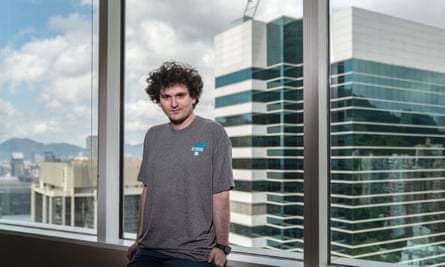[ad_1]
Just a few years ago, Charlie Javice was riding high. In 2019 the tech CEO landed a spot on Forbes’s 30 Under 30 list for her work on a startup called Frank, which she described as “Amazon for higher education”. What does that catchy but completely empty phrase mean? It means Frank helped students navigate the financial aid process. It was apparently so successfully at doing this that JPMorgan Chase acquired the company for $175m in 2021 and Javice was made a managing partner at the bank. The entrepreneur shared the news on LinkedIn, boasting that in just four years Frank had grown to serve “over 5 million students at over 6,000 colleges”.
Turns out those numbers might have been just a teeny bit exaggerated. On Tuesday Javice, 31, was charged by the justice department with “falsely and dramatically inflating the number of customers of her company” in order to get JPMorgan Chase to buy it. According to the lawsuit, Frank only had about 300,000 clients and fabricated data to show a larger customer base. She enlisted a data scientist to make up a few million customers, basically, and JPMorgan, which has about 240,000 employees and pays its CEO $34.5m for his expertise, didn’t seem to spot this in its due diligence.
Javice has been charged with separate counts of conspiracy to commit wire and bank fraud, each of which carries a maximum sentence of 30 years in prison. Javice has denied all the allegations against her.
Javice, as eagle-eyed Twitter users were quick to note, is not the first Forbes 30 Under 30 alum to suddenly be looking at decades in jail. In 2021, Sam Bankman-Fried, a self-described “effective altruist”, made the list. Following the dramatic collapse of his former crypto exchange FTX, he’s facing a litany of charges ranging from bribing a foreign government to money laundering to making unlawful political contributions. His colleague Caroline Ellison, the former co-CEO of Alameda Research, made the list in 2022. In December, Ellison pleaded guilty to seven criminal charges carrying a maximum sentence of 110 years in prison – her cooperation means she’ll likely get a far more lenient punishment.

Another embarrassing Forbes alum is Martin “Pharma Bro” Shkreli, who was in the finance category of the list in 2012. He was sentenced to seven years in prison in 2018 for securities fraud but got out of prison last year and immediately launched an investing newsletter.
While Elizabeth Holmes never actually made the 30 Under 30 list, she did headline the Forbes Under 30 Summit, so she gets an honorary mention. So does Trevor Milton, the founder of a hydrogen-powered truck company called Nikola, who was on a 2020 Forbes list called 12 under 40, listing the youngest billionaires on the Forbes 400. “Trevor Milton, the 38-year-old college dropout behind zero-emission truckmaker Nikola Motor, joins the ranks of America’s richest millennials after tripling his net worth in less than a year,” the piece gushed. You know how he got rich so quick? You guessed it: with just a little sprinkling of crime. Perhaps most notably, Nikola made a demo video showing its non-functional truck rolling downhill but tilted the camera to make it look like it was traveling under its own power on a flat road. Milton has been convicted of fraud and is awaiting sentencing in June. No doubt if he does go to jail he’ll get out after a few months and start a green energy podcast.
“The Forbes 30 Under 30 have collectively raised $5.3B in funding,” the tech entrepreneur Chris Bakke tweeted on Tuesday. “The Forbes 30 Under 30 have also been arrested for frauds and scams worth over $18.5B. Incredible track record.” The first number comes from Forbes and the second is Bakke’s own back-of-an-envelope calculation, but you get the gist: the line between innovator and fraudster seems to have become alarmingly thin.
The problem here isn’t Forbes, of course; the problem is the vision of success that we’ve been sold and the fetishizing of youth. 30 Under 30 isn’t just a list, it’s a mentality: a pressure to achieve great things before youth slips away from you. The pressure can lead certain ambitious people to take shortcuts. And, in fact, shortcuts are encouraged: millennials, after all, grew up being told to “fake it ’til you make it”, cash in now until you become a withered, irrelevant, 30-year-old prune. If you exaggerate a little bit, that’s not fraud, that’s hustle! Until, of course, the justice department comes knocking.
[ad_2]
Source link
